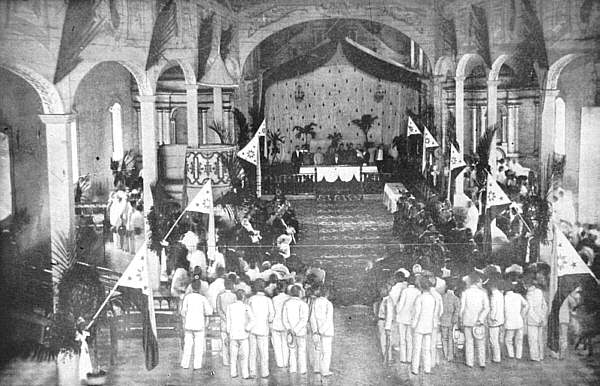|
DZME
DZME (1530 AM) is a radio station owned and operated by Capitol Broadcasting Center in the Philippines. The station's studio is located at Unit 1802, 18/F, OMM-Citra Building, San Miguel Avenue, Ortigas Center, Pasig City, Metro Manila and its transmitter is located at #78 Flamengco St., Brgy. Panghulo, Obando, Bulacan Province. This station operates daily from 4:00 AM to midnight. History DZYY (now DZME) started its broadcast on May 4, 1964, when the Congress authorized Capitol Broadcasting Center of Jose M. Luison and Sons, Inc. to operate an AM radio station nationwide. During the first ten years of operations, the station operated on the frequency of 1540 kHz until November 1978, when it was reassigned on the current frequency of 1530 kHz. In August 1987, the then former president Corazon Aquino, through the National Telecommunications Commission, ordered to shut down DZME for a few months, on a ground that the national security is at grave risk. The station ... [...More Info...] [...Related Items...] OR: [Wikipedia] [Google] [Baidu] |
Obando, Bulacan
Obando, officially the Municipality of Obando ( tgl, Bayan ng Obando), is a 2nd class municipality in the province of Bulacan, Philippines. According to the 2020 census, it has a population of 59,978 people. It is away from the Philippine capital Manila and is part of Manila's conurbation which reaches San Ildefonso in its northernmost part.''Obando, Bayang Pinagpala!'' (Obando, Blessed Town!), ''Pamahalaang Bayan ng Obando'' (Local Government of Obando), 2006/2007 History In the 18th century, the municipalities now known as Meycauayan, Valenzuela (formerly Polo) and Obando comprised only one town, the Municipality of Meycauayan. The town of Polo and Obando, formed a barrio called Catanghalan. In the year 1623, the municipality of Polo was organized which included the present-day territories of the Town of Obando. By virtue of a decree promulgated during the time of Governor and Captain General of the Archipelago, Francisco Jose de Obando y Solis, the town was created and s ... [...More Info...] [...Related Items...] OR: [Wikipedia] [Google] [Baidu] |
Capitol Broadcasting Center
Capitol Broadcasting Center is a Philippine radio network. Its corporate office is located at Unit 1802, 18/F, OMM-Citra Building, San Miguel Avenue, Ortigas Center, Pasig City Pasig, officially the City of Pasig ( fil, Lungsod ng Pasig), is a 1st class highly urbanized city in the National Capital Region of the Philippines. According to the 2020 census, it has a population of 803,159 people. It is located along the .... CBC Stations AM Stations FM Stations ;Like Radio ;Other Brands Former Stations References Radio stations in the Philippines Philippine radio networks {{Philippines-media-stub ... [...More Info...] [...Related Items...] OR: [Wikipedia] [Google] [Baidu] |
Pasig
Pasig, officially the City of Pasig ( fil, Lungsod ng Pasig), is a 1st class Cities of the Philippines#Legal classification, highly urbanized city in the Metro Manila, National Capital Region of the Philippines. According to the 2020 census, it has a population of 803,159 people. It is located along the eastern border of Metro Manila with Rizal province, the city shares its name with the Pasig River. A formerly rural settlement, Pasig is primarily residential and industrial, but has been becoming increasingly commercial district, commercial in recent years, particularly after the construction of the Ortigas Center business district in its west. The city is home to the Roman Catholic Diocese of Pasig, based in Pasig Cathedral, a landmark built around the same time as the town's foundation in 1573. Pasig was formerly part of Rizal province before the formation of Metro Manila, the Capital region, national capital region of the country. The seat of government of Rizal was hosted ... [...More Info...] [...Related Items...] OR: [Wikipedia] [Google] [Baidu] |
Radio Stations In Metro Manila
Radio is the technology of signaling and communicating using radio waves. Radio waves are electromagnetic waves of frequency between 30 hertz (Hz) and 300 gigahertz (GHz). They are generated by an electronic device called a transmitter connected to an antenna which radiates the waves, and received by another antenna connected to a radio receiver. Radio is very widely used in modern technology, in radio communication, radar, radio navigation, remote control, remote sensing, and other applications. In radio communication, used in radio and television broadcasting, cell phones, two-way radios, wireless networking, and satellite communication, among numerous other uses, radio waves are used to carry information across space from a transmitter to a receiver, by modulating the radio signal (impressing an information signal on the radio wave by varying some aspect of the wave) in the transmitter. In radar, used to locate and track objects like aircraft, ships, spacecraft ... [...More Info...] [...Related Items...] OR: [Wikipedia] [Google] [Baidu] |
Bank Of The Philippine Islands
Bank of the Philippine Islands ( fil, Bangko ng Kapuluang Pilipinas, es, Banco de las Islas Filipinas, commonly known as BPI; ) is a universal bank in the Philippines. It is the first bank in both the Philippines and Southeast Asia. It is the fourth largest bank in terms of assets, the second largest bank in terms of market capitalization, and one of the most profitable banks in the Philippines. The bank has a network of over 900 branches in the Philippines, Hong Kong and Europe, and more than 3,000 ATMs and CDMs (cash deposit machines). BPI was founded during the Spanish colonial era of the Philippines as El Banco Español Filipino de Isabel II. It provided credit to the National Treasury and printed and issued the Philippine peso fuerte, a precursor to today's Philippine peso. History Colonial period BPI was established on August 1, 1851, as the "El Banco Español Filipino de Isabel II" (), named after the Queen of Spain, Isabella II, the daughter of King Ferdinan ... [...More Info...] [...Related Items...] OR: [Wikipedia] [Google] [Baidu] |
Prospero Pichay Jr
Prospero ( ) is a fictional character and the protagonist of William Shakespeare's play '' The Tempest''. Prospero is the rightful Duke of Milan, whose usurping brother, Antonio, had put him (with his three-year-old daughter, Miranda) to sea on a "rotten carcass" of a boat to die, twelve years before the play begins. Prospero and Miranda had survived and found exile on a small island. He has learned sorcery from books, and uses it while on the island to protect Miranda and control the other characters. Before the play has begun, Prospero has freed the magical spirit Ariel from entrapment within "a cloven pine". Ariel is beholden to Prospero after he is freed from his imprisonment inside the pine tree. Prospero then takes Ariel as a slave. Prospero's sorcery is sufficiently powerful to control Ariel and other spirits, as well as to alter weather and even raise the dead: "Graves at my command have waked their sleepers, oped, and let 'em forth, by my so potent Art." - Act V, sc ... [...More Info...] [...Related Items...] OR: [Wikipedia] [Google] [Baidu] |
Surigao Del Sur
Surigao del Sur ( Surigaonon: ''Probinsya nan Surigao del Sur''; ceb, Habagatang Surigao; tl, Timog Surigao), officially the Province of Surigao del Sur, is a province in the Philippines located in the Caraga region in Mindanao. Its capital is Tandag City. Surigao del Sur is situated at the eastern coast of Mindanao and faces the Philippine Sea to the east. Etymology There are two hypotheses on the original meaning of "Surigao" among linguists, depending on the original root word. If the root word was taken to be ''sulig'' ("sprout" or "spring up"), then Surigao may have derived from ("spring water"), likely referring to the Surigao River (known as "Suligaw" in Mandaya) that empties at the northern tip of the island of Mindanao. Early historical accounts record the name of the river as , Surigao, or Zurigan. Another possibility is that it is derived from Visayan or ''suyogao'', meaning "water current". From ''suyog'' (also ''sulog'' or ), "current"; cf. Sinulog, Sulu, an ... [...More Info...] [...Related Items...] OR: [Wikipedia] [Google] [Baidu] |
National Telecommunications Commission
The National Telecommunications Commission (NTC; fil, Pambansang Komisyon sa Telekomunikasyon) is an attached agency of the Department of Information and Communications Technology responsible for the supervision, adjudication and control over all telecommunications services and television and radio networks throughout the Philippines. History The National Telecommunications Commission (NTC) was created under Executive Order No. 546 promulgated on July 23, 1979, and conferred with regulatory and quasi-judicial functions taken over from the Board of Communications and the Telecommunications Control Bureau, which were abolished in the same Order. Primarily, the NTC is the sole body that exercises jurisdiction over the supervision, adjudication and control over all telecommunications services and television networks throughout the country. For the effective enforcement of this responsibility, it adopts and promotes guidelines, rules, and regulations on the establishment, operation, ... [...More Info...] [...Related Items...] OR: [Wikipedia] [Google] [Baidu] |
Corazon Aquino
Maria Corazon "Cory" Sumulong Cojuangco-Aquino (; ; January 25, 1933 – August 1, 2009) was a Filipina politician who served as the 11th president of the Philippines from 1986 to 1992. She was the most prominent figure of the 1986 People Power Revolution, which ended the two-decade rule of President Ferdinand Marcos and led to the establishment of the current democratic Fifth Philippine Republic. Corazon Aquino was married to Senator Benigno Aquino Jr., who was one of the most prominent critics of President Marcos. After the assassination of her husband on August 21, 1983, she emerged as leader of the opposition against the president. In late 1985, Marcos called for a snap election, and Aquino ran for president with former Senator Salvador Laurel as her running mate for vice president. After the election held on February 7, 1986, the Batasang Pambansa proclaimed Marcos and his running mate Arturo Tolentino as the winners, which prompted allegations of electoral f ... [...More Info...] [...Related Items...] OR: [Wikipedia] [Google] [Baidu] |
Bulacan
Bulacan, officially the Province of Bulacan ( tl, Lalawigan ng Bulacan), is a province in the Philippines located in the Central Luzon region. Its capital is the city of Malolos. Bulacan was established on August 15, 1578, and part of the Metro Luzon Urban Beltway Super Region. It has 569 barangays in 20 municipalities and four component cities (Baliuag, Malolos the provincial capital, Meycauayan, and San Jose del Monte). Bulacan is located immediately north of Metro Manila. Bordering Bulacan are the provinces of Pampanga to the west, Nueva Ecija to the north, Aurora and Quezon to the east, and Metro Manila and Rizal to the south. Bulacan also lies on the north-eastern shore of Manila Bay. In the 2020 census, Bulacan had a population of 3,708,890 people, the most populous in Central Luzon and the third most populous in the Philippines, after Cebu and Cavite. Bulacan's most populated city is San Jose del Monte, the most populated municipality is Santa Maria while the ... [...More Info...] [...Related Items...] OR: [Wikipedia] [Google] [Baidu] |
Metro Manila
Metropolitan Manila (often shortened as Metro Manila; fil, Kalakhang Maynila), officially the National Capital Region (NCR; fil, link=no, Pambansang Punong Rehiyon), is the capital region, seat of government and one of three List of metropolitan areas in the Philippines, defined metropolitan areas in the Philippines. It is composed of 16 Cities of the Philippines#Legal classification, highly urbanized cities: the Manila, city of Manila, Quezon City, Caloocan, Las Piñas, Makati, Malabon, Mandaluyong, Marikina, Muntinlupa, Navotas, Parañaque, Pasay, Pasig, San Juan, Metro Manila, San Juan, Taguig, and Valenzuela, Metro Manila, Valenzuela, as well as the municipality of Pateros. The region encompasses an area of and a population of as of 2020. It is the second most populous and the most densely populated Regions of the Philippines, region of the Philippines. It is also the List of metropolitan areas in Asia, 9th most populous metropolitan area in Asia and the List of larges ... [...More Info...] [...Related Items...] OR: [Wikipedia] [Google] [Baidu] |





